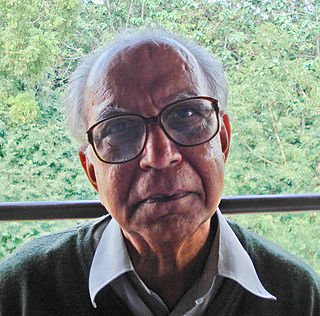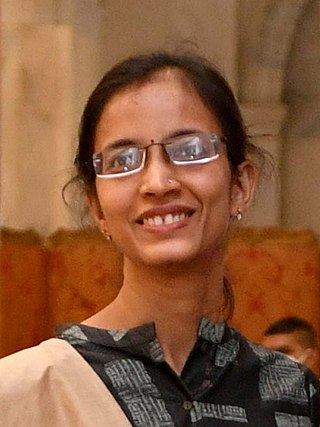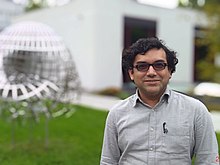
Shiraz Naval Minwalla is an Indian theoretical physicist and string theorist. He is a faculty member in the Department of Theoretical Physics at Tata Institute of Fundamental Research, Mumbai. Prior to his present position, Minwalla was a Harvard Junior Fellow and subsequently an assistant professor at Harvard University.

Manindra Agrawal is an Indian computer scientist and professor at the Department of Computer Science and Engineering at the Indian Institute of Technology, Kanpur. He was the recipient of the first Infosys Prize for Mathematics, the Godel Prize in 2006; and the Shanti Swarup Bhatnagar Award in Mathematical Sciences in 2003. He has been honoured with Padma Shri, India's 4th highest civilian award, in 2013.

The TIFR Centre for Applicable Mathematics is part of the School of Mathematics of the Tata Institute of Fundamental Research.

Akshay Venkatesh is an Australian mathematician and a professor at the School of Mathematics at the Institute for Advanced Study. His research interests are in the fields of counting, equidistribution problems in automorphic forms and number theory, in particular representation theory, locally symmetric spaces, ergodic theory, and algebraic topology.

Mudumbai Seshachalu NarasimhanFRS was an Indian mathematician. His focus areas included number theory, algebraic geometry, representation theory, and partial differential equations. He was a pioneer in the study of moduli spaces of holomorphic vector bundles on projective varieties. His work is considered the foundation for Kobayashi–Hitchin correspondence that links differential geometry and algebraic geometry of vector bundles over complex manifolds. He was also known for his collaboration with mathematician C. S. Seshadri, for their proof of the Narasimhan–Seshadri theorem which proved the necessary conditions for stable vector bundles on a Riemann surface.

Mahan Mj, also known as Mahan Maharaj and Swami Vidyanathananda, is an Indian mathematician and monk of the Ramakrishna Order. He is currently Professor of Mathematics at the Tata Institute of Fundamental Research in Mumbai. He is a recipient of the 2011 Shanti Swarup Bhatnagar Award in mathematical sciences and the Infosys Prize 2015 for Mathematical Sciences. He is best known for his work in hyperbolic geometry, geometric group theory, low-dimensional topology and complex geometry.
Anadi Sankar Gupta was an Indian mathematician. Till his death, he was an INSA Senior Scientist and emeritus faculty with the Department of Mathematics, IIT Kharagpur.

Rajendra Bhatia is an Indian mathematician, author, and educator. He is currently a professor of mathematics at Ashoka University located in Sonipat, Haryana ,India.
Tarlok Nath Shorey is an Indian mathematician who specialises in theory of numbers. He is currently a distinguished professor in the department of mathematics at IIT Bombay. Previously, he worked at TIFR.

Tyakal Nanjundiah Venkataramana is an Indian mathematician who specialises in algebraic groups and automorphic forms.
Eknath Prabhakar Ghate is a mathematician specialising in number theory and working at the School of Mathematics, Tata Institute of Fundamental Research, Mumbai, India. He was awarded the Shanti Swarup Bhatnagar Prize for science and technology, the highest science award in India, for the year 2013 in the mathematical sciences category.
Sanghamitra Bandyopadhyay is an Indian computer scientist specializing in computational biology. A professor at the Indian Statistical Institute, Kolkata, she is a Shanti Swarup Bhatnagar Prize winner in Engineering Science for 2010, IInfosys Prize 2017 laureate in the Engineering and Computer Science category and TWAS Prize winner for Engineering Sciences in 2018. Her research is mainly in the areas of evolutionary computation, pattern recognition, machine learning and bioinformatics. Since 1 August 2015, she has been the Director of the Indian Statistical Institute, and she would oversee the functioning of all five centres of Indian Statistical Institute located at Kolkata, Bangalore, Delhi, Chennai, and Tezpur besides several other Statistical Quality Control & Operation Research Units spread across India. She is the first woman Director of the Indian Statistical Institute. Currently she is on the Prime Ministers' Science, Technology and Innovation Advisory Council. In 2022 she was given the Padma Shri award for Science and Engineering by the Government of India.
Abhishek Dhar is an Indian physicist specialising in statistical physics and condensed matter physics. He is a Professor in the International Centre for Theoretical Sciences, Bangalore.
Aninda Sinha is an Indian theoretical physicist working as a professor at Center for High Energy Physics, Indian Institute of Science in Bangalore, India.

Neena Gupta is a professor at the Statistics and Mathematics Unit of the Indian Statistical Institute (ISI), Kolkata. Her primary fields of interest are commutative algebra and affine algebraic geometry.

Upinder Singh Bhalla is an Indian computational neuroscientist, academic and a professor at National Centre for Biological Sciences of the Tata Institute of Fundamental Research. He is known for his studies on neuronal and synaptic signalling in memory and olfactory coding using computational and experimental methods and is an elected fellow of the Indian Academy of Sciences and the Indian National Science Academy. The Council of Scientific and Industrial Research, the apex agency of the Government of India for scientific research, awarded him the Shanti Swarup Bhatnagar Prize for Science and Technology, one of the highest Indian science awards, in 2007, for his contributions to biological sciences. The Infosys Science Foundation awarded him the Infosys Prize 2017 in Life Sciences for his pioneering contributions to the understanding of the brain's computational machinery.
Amalendu Krishna is an Indian mathematician in the Department of Mathematics, Indian Institute of Science (IISc), Bangalore, specializing in algebraic cycles and K-theory. He was awarded the Shanti Swarup Bhatnagar Prize for Science and Technology, India's highest prize for excellence in science, mathematics and technology, in the mathematical sciences category in the year 2016.

Atish Dabholkar is an Indian theoretical physicist. He is currently the Director of the Abdus Salam International Centre for Theoretical Physics (ICTP) with the rank of Assistant Director-General, UNESCO. Prior to that, he was head of ICTP's High Energy, Cosmology and Astroparticle Physics section, and also Directeur de Recherche at the Centre National de la Recherche Scientifique (CNRS) at Sorbonne University in the "Laboratoire de Physique Théorique et Hautes Énergies" (LPTHE).
Nissim Kanekar is an Indian astrophysicist, cosmologist and a professor at National Centre for Radio Astrophysics of Tata Institute of Fundamental Research. Known for his research on the evolution of the electron proton mass ratio, Kanekar is a member of the International Astronomical Union and a recipient of Swarna Jayathi Fellowship of the Department of Science and Technology. The Council of Scientific and Industrial Research, the apex agency of the Government of India for scientific research, awarded him the Shanti Swarup Bhatnagar Prize for Science and Technology, one of the highest Indian science awards, for his contributions to physical sciences in 2017.
Dr. Rajat Subhra Hazra is an Indian mathematician specialising in probability theory. He was awarded the Shanti Swarup Bhatnagar Prize for Science and Technology, the highest science award in India, for the year 2020 in mathematical science category. He is affiliated to the Mathematical Institute of Leiden University, the Netherlands from 2021. Prior to that he was affiliated to Indian Statistical Institute, Kolkata. Dr. Hazra has a very broad range of research interests including extreme value theory, regular variation, random matrices, free probability, Gaussian free fields, branching random walks, membrane models, random graphs, etc.











